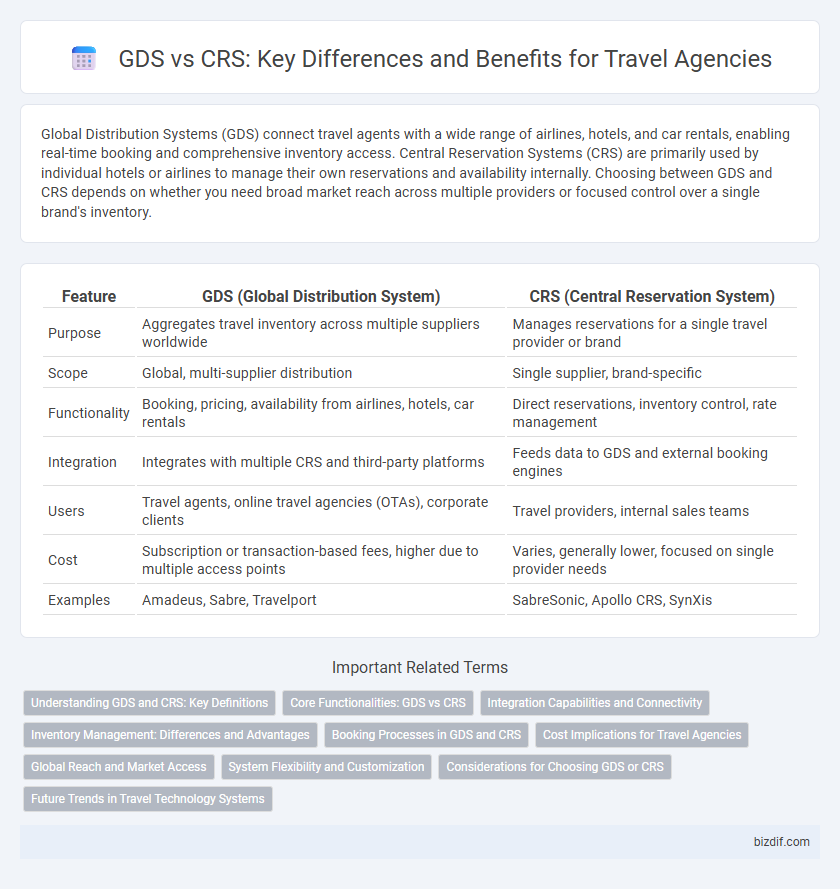Global Distribution Systems (GDS) connect travel agents with a wide range of airlines, hotels, and car rentals, enabling real-time booking and comprehensive inventory access. Central Reservation Systems (CRS) are primarily used by individual hotels or airlines to manage their own reservations and availability internally. Choosing between GDS and CRS depends on whether you need broad market reach across multiple providers or focused control over a single brand's inventory.
Table of Comparison
| Feature | GDS (Global Distribution System) | CRS (Central Reservation System) |
|---|---|---|
| Purpose | Aggregates travel inventory across multiple suppliers worldwide | Manages reservations for a single travel provider or brand |
| Scope | Global, multi-supplier distribution | Single supplier, brand-specific |
| Functionality | Booking, pricing, availability from airlines, hotels, car rentals | Direct reservations, inventory control, rate management |
| Integration | Integrates with multiple CRS and third-party platforms | Feeds data to GDS and external booking engines |
| Users | Travel agents, online travel agencies (OTAs), corporate clients | Travel providers, internal sales teams |
| Cost | Subscription or transaction-based fees, higher due to multiple access points | Varies, generally lower, focused on single provider needs |
| Examples | Amadeus, Sabre, Travelport | SabreSonic, Apollo CRS, SynXis |
Understanding GDS and CRS: Key Definitions
Global Distribution Systems (GDS) are computerized networks that enable travel agencies to access and book airline seats, hotel rooms, car rentals, and other travel services worldwide. Central Reservation Systems (CRS) are proprietary platforms used by individual airlines or hotel chains to manage their inventory, pricing, and reservations directly. Understanding the distinction between GDS's broad marketplace connectivity and CRS's focused inventory control is essential for optimizing travel booking efficiency and accuracy.
Core Functionalities: GDS vs CRS
Global Distribution Systems (GDS) provide a comprehensive platform connecting travel agents with multiple airlines, hotels, and car rental companies to enable real-time booking and inventory management. Central Reservation Systems (CRS) focus primarily on a single travel supplier's inventory, streamlining direct reservations and ensuring accurate availability and pricing updates. Both systems optimize booking efficiency, but GDS offers broader market access while CRS delivers tighter control over proprietary inventory.
Integration Capabilities and Connectivity
Global Distribution Systems (GDS) offer extensive integration capabilities by connecting travel agencies with a wide range of airline, hotel, and car rental inventories through a unified platform, enhancing real-time booking efficiency. Central Reservation Systems (CRS) focus on managing direct inventory and bookings for a single hotel or airline but often require additional middleware to integrate with external distribution channels. Robust integration and seamless connectivity with GDS platforms remain essential for CRS to expand market reach and optimize sales performance.
Inventory Management: Differences and Advantages
Global Distribution Systems (GDS) aggregate travel inventory from multiple suppliers, providing travel agencies access to diverse flight, hotel, and car rental options in one platform, enhancing booking efficiency. Central Reservation Systems (CRS) manage inventory for a single supplier, offering real-time updates and direct control over availability, pricing, and promotions. While GDS excels in distributing a wide range of global inventory, CRS provides superior accuracy and customization for inventory management within one travel brand.
Booking Processes in GDS and CRS
Global Distribution Systems (GDS) streamline booking processes by connecting travel agents to multiple airlines, hotels, and car rental providers in real time, enabling instant access to availability and pricing. Central Reservation Systems (CRS) are primarily used by individual service providers to manage direct bookings and inventory control within their own offerings. Efficient integration of GDS and CRS enhances booking accuracy, reduces double-booking risks, and optimizes customer service in travel agency operations.
Cost Implications for Travel Agencies
Global Distribution Systems (GDS) often involve higher transaction fees for travel agencies compared to Computer Reservation Systems (CRS), which can lead to increased operational costs. CRS platforms typically offer more streamlined, cost-effective booking solutions by reducing reliance on third-party vendors. Travel agencies must carefully evaluate GDS fees versus the direct booking efficiencies of CRS to optimize overall expenditure.
Global Reach and Market Access
Global Distribution Systems (GDS) offer extensive global reach by connecting travel agencies to a vast network of airlines, hotels, and car rental services worldwide, enhancing market access across multiple regions. Central Reservation Systems (CRS) typically focus on a specific airline or hotel chain, limiting market access to a narrower inventory but providing detailed control over availability and pricing. Leveraging GDS allows travel agencies to maximize international market penetration and diversify travel product offerings efficiently.
System Flexibility and Customization
Global Distribution Systems (GDS) offer broad connectivity across multiple airlines, hotels, and car rental services, but typically provide limited flexibility in customization for travel agencies. Central Reservation Systems (CRS) deliver enhanced system flexibility, allowing agencies to tailor booking interfaces, pricing rules, and inventory management to specific business needs. CRS solutions facilitate deeper integration with proprietary platforms and personalized customer experiences, optimizing operational efficiency and service differentiation.
Considerations for Choosing GDS or CRS
Choosing between a Global Distribution System (GDS) and a Central Reservation System (CRS) depends on the scale and scope of the travel agency's operations, with GDS offering extensive access to multiple suppliers and CRS providing tailored control over bookings. Agencies must consider factors such as integration capabilities, cost efficiency, and the need for real-time inventory management to optimize customer service and operational workflows. Understanding the target market and preferred distribution channels also plays a crucial role in determining whether GDS's broad reach or CRS's customized solutions better align with business goals.
Future Trends in Travel Technology Systems
Future trends in travel technology systems indicate a shift from traditional Global Distribution Systems (GDS) towards more integrated, cloud-based Central Reservation Systems (CRS) that offer enhanced real-time data processing and personalized customer experiences. Artificial intelligence and machine learning are increasingly embedded in these platforms to optimize booking accuracy, dynamic pricing, and predictive analytics. The evolving landscape favors seamless API integrations between GDS and CRS, enabling travel agencies to deliver faster, more flexible service tailored to modern traveler demands.
GDS vs CRS Infographic

 bizdif.com
bizdif.com